Rudy Giuliani Suggests Trump Could Ignore A Mueller Subpoena
Rudy Giuliani is basically now suggesting that his client would be willing to set off a Constitutional crisis that would make Watergate seem like a picnic.
Last week, Rudy Giuliani caused real headaches for his new client when he revealed on national television that, contrary to the position that the President and the Administration had been taking, the President did reimburse his longtime attorney and “fixer” Michael Cohen for the $130,000 payment that Cohen made to porn star Stormy Daniels on the eve of the 2016 election, and that Trump knew what the payment was for long before he claims he denied knowing that. Additionally, Giuliani reinforced the notion that the real reason for the firing of James Comey one year ago tomorrow was due to the Russia investigation. On Sunday, though, the President’s newest attorney pushed the envelope even further, suggesting that the President could refuse an interview with Special Counsel Robert Mueller and that he could decline to comply with a subpoena:
WASHINGTON — Rudolph W. Giuliani, reeling after a chaotic first week as President Trump’s lawyer, tried again on Sunday to straighten out his client’s story. But Mr. Giuliani raised new questions about whether Mr. Trump had paid hush money to other women and suggested the president might invoke the Fifth Amendment to avoid testifying in the special counsel’s Russia investigation.
Mr. Giuliani, a former federal prosecutor and New York City mayor hired by Mr. Trump to smooth communication between the White House and the special counsel, Robert S. Mueller III, instead painted Mr. Mueller as an out-of-control prosecutor bent on trapping Mr. Trump into committing perjury. The president, he said, could defy a subpoena to testify.
“We don’t have to,” Mr. Giuliani said in a rambling, 22-minute interview on ABC’s “This Week” program. “He’s the president of the United States. We can assert the same privileges other presidents have.”
Mr. Giuliani, who met with the special counsel’s office shortly after joining the legal team last month, said he and another lawyer, Jay Sekulow, agreed that the president should not speak to Mr. Mueller. But he acknowledged that he had little, if any, control over the president, who said as recently as Friday that he still wanted to speak to the special counsel.
“How can I ever be confident of that?” Mr. Giuliani said, when asked whether Mr. Trump would not invoke his right to avoid self-incrimination. “I’m facing a situation with the president and all the other lawyers are, in which every lawyer in America thinks he would be a fool to testify, I’ve got a client who wants to testify.”
It was one of several startling admissions by Mr. Giuliani, during his first extended television appearance since Mr. Trump criticized him last week as not having his “facts straight” about payments made to a pornographic film actress, Stephanie Clifford. Mr. Giuliani said it was possible that Mr. Trump’s personal attorney, Michael D. Cohen, had made additional payments to other women on the president’s behalf.
“I have no knowledge of that,” Mr. Giuliani said when asked about other payments, “but I would think if it was necessary, yes.”
If Mr. Trump were to invoke the Fifth Amendment, he would undercut his longstanding claim that he has nothing to hide about his campaign’s ties to Russia. During the presidential campaign, he ridiculed his Democratic opponent, Hillary Clinton, when some of her aides invoked the Fifth Amendment during a congressional investigation of Mrs. Clinton’s use of a private email server.
“The mob takes the Fifth,” Mr. Trump said at a campaign rally in Iowa in September 2016. “If you’re innocent, why are you taking the Fifth Amendment?”
After his interview, Mr. Giuliani met with Mr. Trump at his golf club in Northern Virginia.
Mr. Giuliani told the ABC anchor, George Stephanopoulos, that he was still getting up to speed on Mr. Trump’s legal issues — a fact that became apparent as the interview went on. As was the case during his interviews last week, Mr. Giuliani seemed to speak largely off the cuff. He speculated freely and contradicted himself, sometimes from one statement to the next.
He said, for example, that Mr. Mueller would be to blame if Mr. Trump refused to testify because his office had leaked a list of questions that the special counsel would like to ask him. But then he admitted he did not know who leaked the questions, which were reported by The New York Times.
Yesterday, The Wall Street Journal plans to announce by May 17th the day that Mueller was appointed Special Counsel reported that Trump’s legal team whether their client will sit down with Mueller. Most likely not coincidentally, that date happens to be the first anniversary of in the Russia investigation by Deputy Attorney General Rod Rosenstein, who took over the supervision of that investigation after Attorney General Sessions recused himself from that role due to his own contacts with Russian officials while serving as a Trump campaign surrogate and adviser. Over the past several months, the question of whether or not Trump would agree to an interview with Sessions has gone back and forth. Trump himself has suggested that he wants to sit down with Sessions and even stated that he would do so under oath, which is largely a symbolic gesture since U.S. law already makes it a crime to lie to a Federal official even if one is not under oath. Trump’s former attorney John Dowd had been working for months on the terms of such an interview, but his decision to leave the legal team put those negotiations on hold. Ostensibly, Giuliani was brought on the team to reopen those talks, but recent developments, including these comments, have thrown the whole question of whether Trump will voluntarily submit to an interview up in the air.
Giuliani’s comments, of course, take the matter a step further. If Trump refuses to agree to a voluntary interview with Mueller and his investigators, Mueller would have the option of issuing a subpoena to bring Trump before a Grand Jury. In such a situation, the President would not be able to have an attorney present, nor would he be able to object to questions beyond refusing to testify based on the Fifth Amendment. This would obviously be an extraordinarily dangerous situation given Trump’s inability to tell the truth even about casual matters and the fact that Mueller and his investigators clearly know more about the matters that he would be questioning Trump about, and certainly more than what Trump’s legal team knows that they know. Preparing anyone for such a Grand Jury appearance would be difficult. Preparing Trump for that type of experience would be next to impossible.
As for Giuliani’s claim that Trump could ignore, or successfully fight in court, a subpoena, that’s far from a settled question and the existing law seems to be on Mueller’s side, as I explained last week:
The most favorable precedent from Mueller’s point of view, of course, would be United States v. Nixon, which dealt with the efforts of Watergate Special Prosecutor Leon Jaworski to subpoena the tape recordings that Nixon had made of conversations in the Oval Office that included conversations he had with top aides regarding the Administration’s response to the Watergate break-in. Jaworski had subpoenaed these tapes shortly after John Dean confirmed to the Watergate committee that there was a recording system in the Oval Office. Initially, the Nixon Administration resisted the subpoena, citing executive privilege among other grounds for withholding the requested tapes. In an expedited ruling, the Supreme Court ruled unanimously, with Justice Rehnquist recusing himself due to his previous position in the Justice Department, that Nixon must turn over the tapes. This, of course, led to the revelation of conversations so incriminating that they made Nixon’s impeachment and removal from office a virtual inevitability. Instead of facing that fate, Nixon resigned.
Given the Nixon precedent, it seems fairly clear to me at least that Trump would be on the losing side of a legal fight over the validity of any potential subpoena. If Oval Office tapes can be subpoenaed then there doesn’t seem to be any reason why the President himself can be subpoenaed to testify as a witness. Of course, if the Russia investigation heads down this path it would like mean months of litigation in the Federal Courts and, ultimately a decision by the Supreme Court. While anything is possible and the makeup of the Court has changed significantly from what it was in 1974 I don’t think that even this court would be willing to ignore the Nixon precedent. For that reason alone, I suspect that eventually, Trump will agree to some kind of interview with Mueller at which his lawyers can be present, but it’s likely to take both sides some time to come to terms on what kind of interview that’s going to be.
This reliance on the Nixon precedent has been repeated by numerous other legal analysts, but Princeton Professor Keith Whittington push back on the argument in a piece at Lawfare:
If Mueller forced the Roberts court to decide the specific question of whether the president could be issued a subpoena ad testificandum, there are at least two considerations that should weigh on the minds of the justices and that might give them pause before extending the logic of United States v. Nixon and Clinton v. Jones.
First are the structural constitutional considerations that counsel against empowering the courts to compel presidential testimony. In earlier cases, the Supreme Court has insisted that the president is not above the law and that courts would not be seeking to perform an executive function by subjecting the president to judicial proceedings. But the question is not whether the president is immune from all legal proceedings. The question is merely whether a judge can compel the person of the president. Thomas Jefferson worried about the possibility that “the several courts could bandy him from pillar to post … and withdraw him entirely from his constitutional duties.” Oliver Ellsworth insisted that a court could not “exercise any Authority over [the person of the president] and Stop the Whole Machine of Government.” Joseph Story thought it was a necessary implication of vesting all executive authority in a single person that the president could not be liable to judicial proceedings that would impair his ability to “discharge … the duties of his office.”
There are many judicial proceedings that are perfectly compatible with the president’s ability to perform his duties, and the Supreme Court has previously stressed that the particular actions it authorized in the cases of Nixon and Clinton were so compatible. The court was certainly right in the Jones case to observe that presidents have been able to find ways to make giving voluntary testimony fit within their duties, and Vladeck and Wittes reasonably argue that it is a short step from the court making that observation in the case of Bill Clinton to the court commanding testimony in the case of Donald Trump. It is surely the case that Trump is able to carve some minutes or hours from his “executive time” to give testimony.
For the courts to claim the power to command the president to testify and to dictate how it is to be done, however, intrudes on the core functioning of a coordinate branch. It no more puts the president “above the law” to acknowledge that he cannot be subpoenaed to testify than to acknowledge that he cannot be put in jail for defying such a subpoena. The court in Clinton v. Jones highlighted the question of whether legal proceedings would be a burdensome “distraction” to the president and concluded that they would not be. In light of how the Lewinsky scandal consumed the Clinton presidency, one might well question the judicial confidence that ongoing litigation would not be a detriment to a functioning presidency. But ultimately presidential distraction was not the problem that Attorney General William Wirt had in mind when he concluded in 1818 that “personal attendance on the court” was inconsistent with the president’s duties to the nation. His concern was that the president’s movements and time could not, consistent with his constitutional duties, be under the command of a judge.
If Mueller forced the Roberts court to decide the specific question of whether the president could be issued a subpoena ad testificandum, there are at least two considerations that should weigh on the minds of the justices and that might give them pause before extending the logic of United States v. Nixon and Clinton v. Jones.
First are the structural constitutional considerations that counsel against empowering the courts to compel presidential testimony. In earlier cases, the Supreme Court has insisted that the president is not above the law and that courts would not be seeking to perform an executive function by subjecting the president to judicial proceedings. But the question is not whether the president is immune from all legal proceedings. The question is merely whether a judge can compel the person of the president. Thomas Jefferson worried about the possibility that “the several courts could bandy him from pillar to post … and withdraw him entirely from his constitutional duties.” Oliver Ellsworth insisted that a court could not “exercise any Authority over [the person of the president] and Stop the Whole Machine of Government.” Joseph Story thought it was a necessary implication of vesting all executive authority in a single person that the president could not be liable to judicial proceedings that would impair his ability to “discharge … the duties of his office.”
There are many judicial proceedings that are perfectly compatible with the president’s ability to perform his duties, and the Supreme Court has previously stressed that the particular actions it authorized in the cases of Nixon and Clinton were so compatible. The court was certainly right in the Jones case to observe that presidents have been able to find ways to make giving voluntary testimony fit within their duties, and Vladeck and Wittes reasonably argue that it is a short step from the court making that observation in the case of Bill Clinton to the court commanding testimony in the case of Donald Trump. It is surely the case that Trump is able to carve some minutes or hours from his “executive time” to give testimony.
For the courts to claim the power to command the president to testify and to dictate how it is to be done, however, intrudes on the core functioning of a coordinate branch. It no more puts the president “above the law” to acknowledge that he cannot be subpoenaed to testify than to acknowledge that he cannot be put in jail for defying such a subpoena. The court in Clinton v. Jones highlighted the question of whether legal proceedings would be a burdensome “distraction” to the president and concluded that they would not be. In light of how the Lewinsky scandal consumed the Clinton presidency, one might well question the judicial confidence that ongoing litigation would not be a detriment to a functioning presidency. But ultimately presidential distraction was not the problem that Attorney General William Wirt had in mind when he concluded in 1818 that “personal attendance on the court” was inconsistent with the president’s duties to the nation. His concern was that the president’s movements and time could not, consistent with his constitutional duties, be under the command of a judge.
Alexander Hamilton noted that the president was the one constitutional officer whose work could be characterized by “decision, activity, secrecy, and dispatch,” and argued that having such an officer was essential to the national interest. If modern transportation and communication technology have alleviated some of Jefferson’s concerns that the president might be called hither and yon by trial judges spread all across the nation, the demands of the modern American government have only heightened the concerns that the president at all times be available for addressing the nation’s business without the necessity of asking leave from a judge. It would be one thing if the subpoena power is to be hollowed out such that the president can dictate to the judge when and how testimony will be offered. But the justices should be reluctant to empower a judge to command the president’s presence no matter the president’s own judgment that he or she is immediately needed elsewhere. Not all presidents will have the relaxed daily schedule that Trump has so far enjoyed.
Whittington does raise some good points here, and it’s possible that a court could decide that a broad and open ended subpoena for testimony issued against a sitting President is bridge too far. However, there are ways to deal with those concerns that would stop short of a blanket ruling that such a subpoena is per se invalid. For example, a court could rule that there must be some sort of time limit placed on the amount of time that the President could be required to appear, or that the testimony would have to be scheduled for a time when the President has more free time available, or that there would be the possibility of the President being able to pause his testimony in the event that fulfilling his Presidential duties required him to be elsewhere at a given point in time. In that regard, scheduling testimony for a weekend, when most of the White House Staff is not at work and the President generally spending time at one of his golf courses, would be one possible alternative. Much of this could be true of a voluntary interview, of course, but there’s no practical reason why Trump could not make himself available at a time convenient to himself, Mueller, and the Grand Jury.
The broader question that Whittington raises is the far more interesting one, namely what could happen if the President were to decide to defy a subpoena to testify even if the courts were to rule that the subpoena itself were completely valid. Ordinarily, of course, someone who refuses to comply with a subpoena would be held in contempt of court and could potentially face jail time until they chose to comply. This isn’t exactly an option with the President of the United States and it’s unclear that a U.S. District Court Judge, or a Judge in the Court of Appeals for the D.C. Circuit (where this would all likely unfold), or a Supreme Court Justice would be willing to go that far.
This means that if Trump were to defy a subpoena even if the Supreme Court ruled it was valid, the only way to punish him would be via impeachment and removal. As Whittington relate at the end of his post, Nixon briefly flirted with that idea:
Nixon flirted with the possibility of defying the Supreme Court after it demanded that he turn over the Watergate tapes. Ultimately, he abandoned that option only after Republican legislators made it clear that he would not survive an impeachment if he took that step. The authority of the court was backed by the will of Congress to remove the president. Could the court count on the current Republican Congress to do the same? Do they really want to find out?
Based on their behavior to date, one doubts that a Republican-controlled Congress would try to impeach the President even in these circumstances. If the Democrats take Congress in November and this unfolds in 2019, the House might move to impeach, but without a two-thirds vote to convict in the Senate, it would be a fruitless move unless enough Republican Senators decide that ignoring a validly issued subpoena is a step too far. Whether that’s the case is by no means certain.
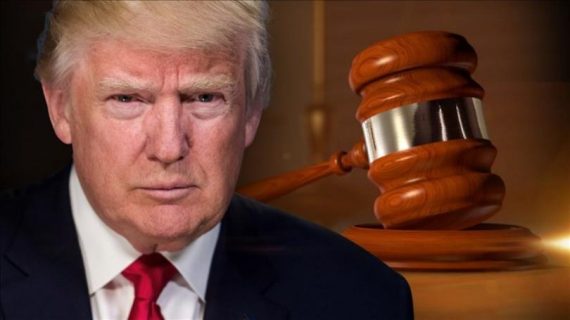

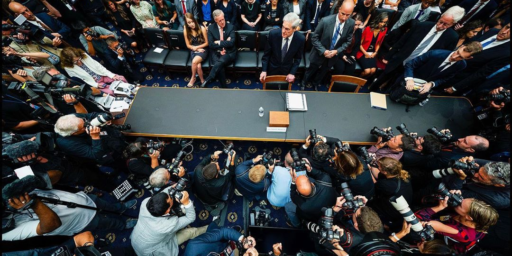
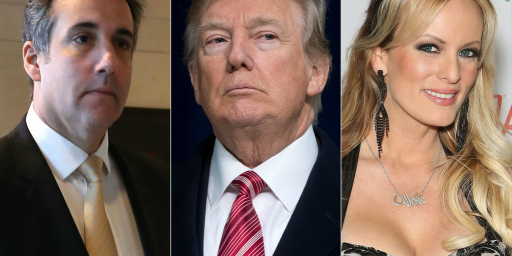
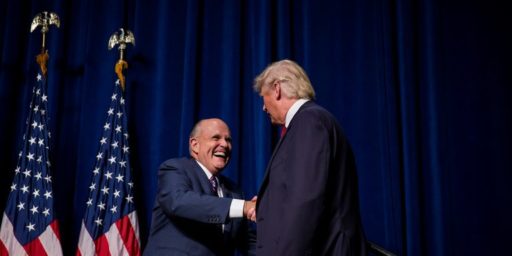
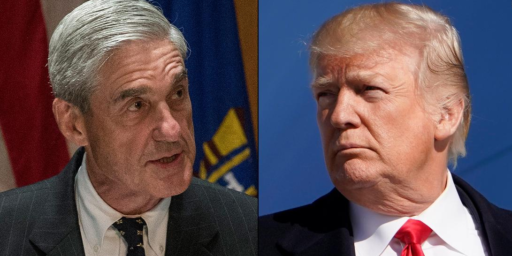
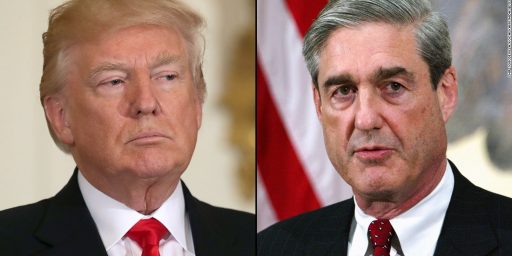
So…is there a reason you didn’t post anything on the judge reading the riot act to Mueller’s lawyers or did I just miss it?
Mike
@MBunge: Editing? Evaluating significance? Intelligence?
Trump is trapped in the criminal’s dilemma. That’s the point when the investigators are closing in, and there are no good options left. also when he realizes there is an objective reality independent of his pronouncements and lies.
This is only a problem if you are guilty of a crime, though.
I think the next time Giuliani is on television, the interviewer should ask if Trump has the same power to repeal the law of gravity that Obama had but never had the courage to use.
I’m betting he walks right into it…
Mbunge: Popehat’s twitter feed has already addressed the judge’s remarks. It wasn’t that big a deal. Go read it for yourself.
@MBunge:
You mean the judge who has put himself at risk of being removed from the case due to bias?
Here Bungles. Read this a few times. See what Trump’s hand picked mouthpiece says about Trump.
Trump is now cracking on his #1 Boyfriend Hannity:
“Because they funneled it through a law firm?” Hannity asked.
Trump better hope nobody ever finds out what else he did with a funnel!
tl/ria*
the Lawfare excerpt repeats paragraphs one through four at the end of the fourth paragraph.
I wasn’t sure till I got to “…bandy him from pillar to post…” the second time.
*too long/read it anyway
Nixon only had to leave because congressional republicans abandoned him.
….
@teve tory:
Given the choice between Trump committing perjury (which he unavoidably would), having his truly dirty laundry exposed, or him fomenting a constitutional crisis because he’s afraid to testify (which is how the attack ads that write themselves would play out), I’ll take any of the above for $1,000, Alex.
Given the rank incompetence shown by Trump the moron and much of his team (not all), one cannot help but assume there is some kind of goal or strategy at play. There may not be. I know. I’ve seen enough rank incompetence elsewhere. One shouldn’t even try to discern purpose when all there is very likely is only reflex or plain nothing (ie reaction to the news or TV).
With the Moron in Chief, I’ve given up. But Giuliani is not a moron (arguably), and he did have a respectable record as a federal prosecutor and as mayor of NYC. So why would he go and do the Trump on TV?
I’ve no idea, and I’m not sure I even want to know. But I hypothesize that he’s been planting some easily digestible tidbits the base can repeat, kind of like the sheep in Orwell’s Animal Farm. “It was not the campaign’s money,” “It had nothing to do with the election,” “it was a loan,” “the loan was repaid,” stuff like that.
That such things don’t matter or aren’t true are of no import to the base. When Cohen or Trump are indicted or accused of violating campaign finance laws, the base will go into Orwellian sheep mode and bleat “It was not the campaign’s money!” “The loan was repaid!” It had nothing to do with the election!” “Four legs good, two legs better!”
Just a thought.